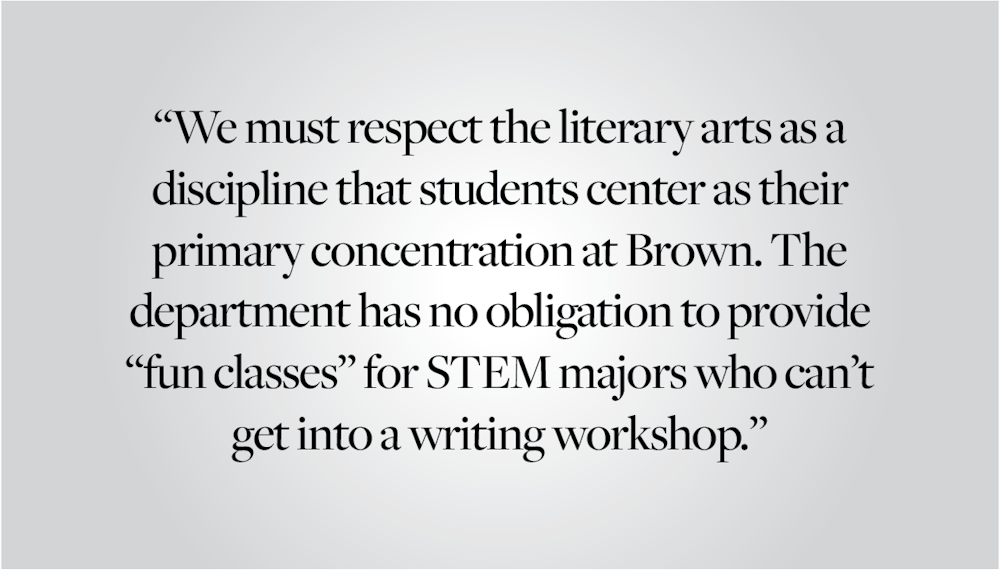I first sought to write this column about how competitive classes and tedious waitlists plague the literary arts department. I was ready to argue that Brown must reform the department’s exclusive seminars and complicated registration processes making it the nebulous, untouchable bastion of ‘not English majors’ that it is. By the title of this article, however, it is clear that somewhere between my outline and final draft, I was convinced otherwise. Though the exclusivity of literary arts classes may undermine the exploratory nature of Brown’s open curriculum, the courses’ arduous entry process is a necessity for upholding the department’s rigorous standard of workshop and seminar.
To clarify, there is a significant difference between classes taught under the English and literary arts departments. Generally, English classes are about reading and then writing about reading. Literary arts is more about writing and then reading about writing (or reading to then write). Since English students are generally graded on their analytical essays and participation in weekly discussion sections, English classes can more feasibly be taught in larger classroom lectures. The whole point of most literary arts classes, however, is to have a discussion section in every class. This makes even the medium-sized lecture impractical and the sub-20 class imperative.
To maintain these small classes, the literary arts department uses multiple selection processes. Most classes besides the introductory courses, for example, require the submission of a writing sample. On top of this, many classes prohibit first-years from registering during the normal registration period, only letting them join the class through a waitlist whose order is dictated by a lottery. Students submit their names to a lottery for a class they are interested in joining, and the lottery determines the order of the class's waitlist. Then, based on how many registered students drop the class during shopping period, the student will either gain entry or not. This amalgamation of hurdles ends up weeding out those serial class pickers with their overzealous primary carts, cultivating small classes of writers who are willing to commit the time and effort that is required for a successful workshop or seminar.
While this system successfully produces classes with strong, talented writers, it fails to embody some of the core values — flexibility and exploration— of the open curriculum. These faults were articulated by columnist Isabella Levine two years ago. It is true that by operating under the principle that small cohorts of serious writers are necessary to produce high-quality workshops, the department is “deprived of an enriching diversity of academic interests.” There is certainly great creative potential in having a writing workshop composed of students who bring an array of academic perspectives. And I agree with Levine that “course offerings specifically for inexperienced students should be expanded,” which would allow students who aren’t necessarily concentrating in literary arts to explore the subject in a more relaxed environment.
Yet, ultimately I find it improbable that a more inclusive process could be executed without depriving the department of the resources needed for higher level courses. We must respect the literary arts as a discipline that students center as their primary concentration at Brown. The department has no obligation to provide “fun classes” for STEM majors who can’t get into a writing workshop. It is a department at Brown that graduates esteemed scholars who go on to accomplish marvelous things in the world of literary arts. The department’s unique need for small classes means we might have to accept the discipline’s exclusivity as an exception and remember that while the open curriculum is flexible, it is also meant to be rigorous.
Paul Hudes ’27 can be reached at paul_hudes@brown.edu. Please send responses to this opinion to letters@browndailyherald.com and other op-eds to opinions@browndailyherald.com.
Paul Hudes is a staff columnist and a member of the editorial page board for the Brown Daily Herald. His column is wide-ranging but focuses mostly on American politics. Paul studies Applied Math Economics and English Literature.





